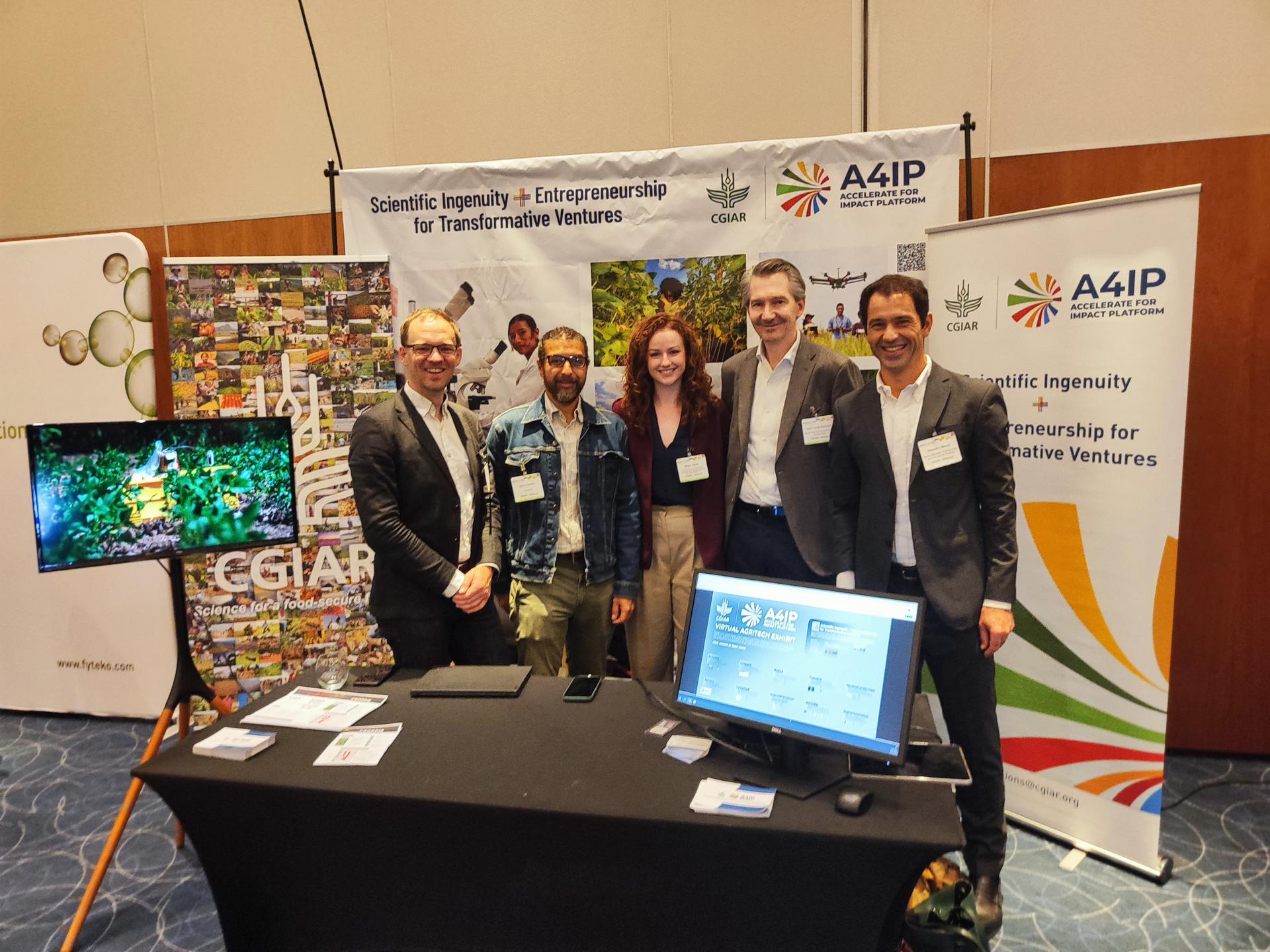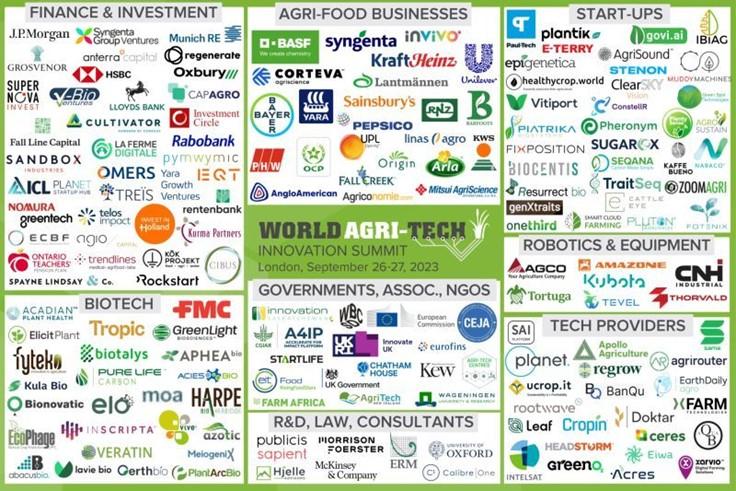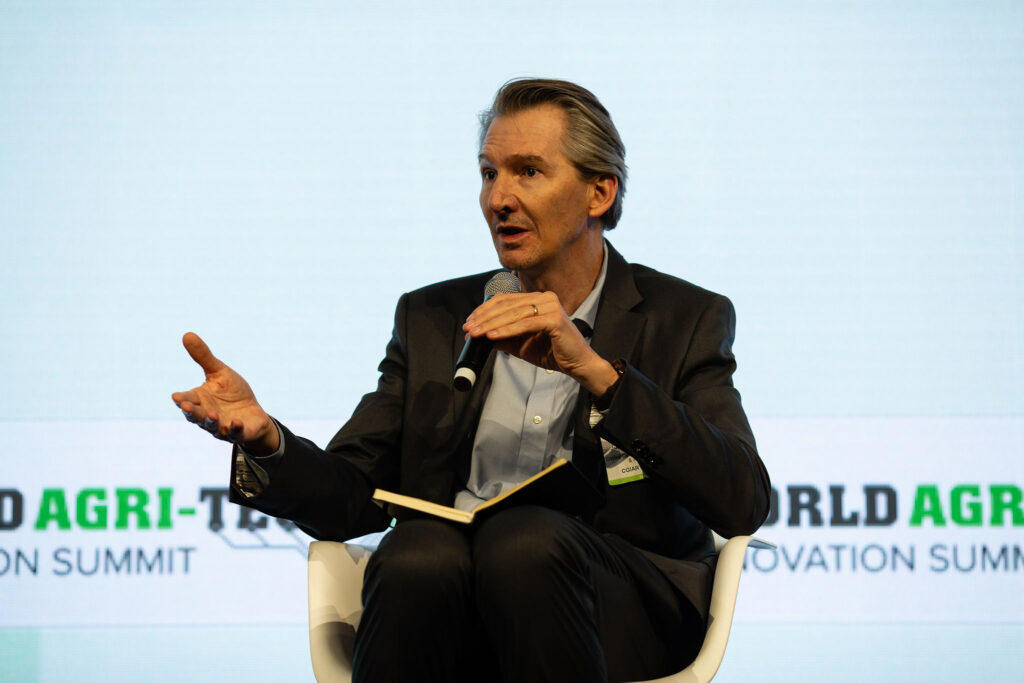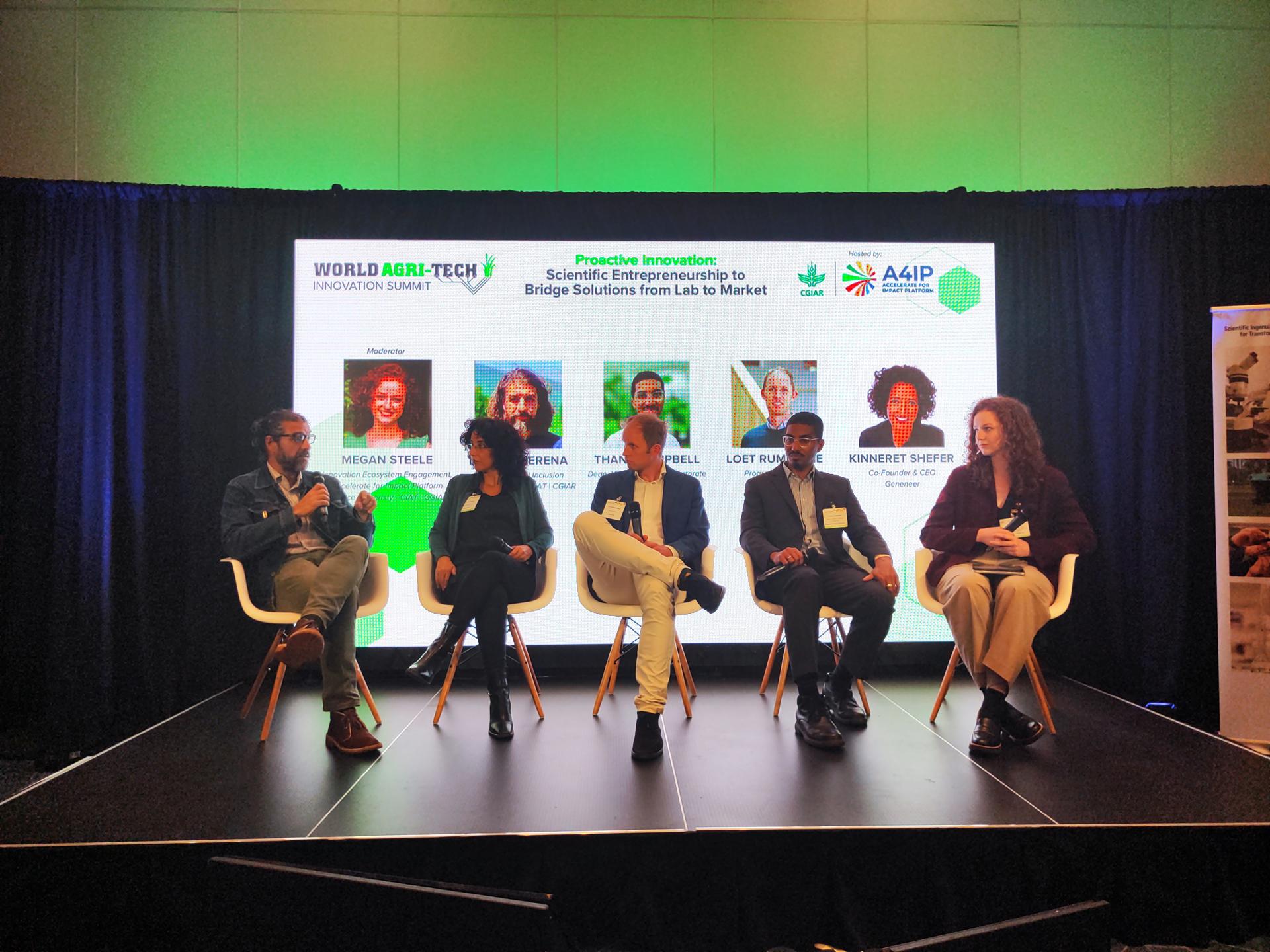Blog Looking back at the World Agri-Tech Innovation Summit through the eyes of Alliance/CGIAR innovators

Alliance/CGIAR’s Accelerate for Impact Platform partnered at the World Agri-Tech Innovation Summit: an event held September 26 and 27 in London to connect leaders in the Agri-Tech innovation ecosystem. A4IP brought along innovators from the Alliance: among them Director General Juan Lucas Restrepo and scientists David Guerena and Christian Bunn. What did scientists take away from this (in their words) “out of the box” event?
On September 26 and 27, a delegation from Alliance/CGIAR and its Accelerate for Impact Platform gathered with nearly 1000 leaders from across the agri-tech innovation ecosystem in London for the World Agri-Tech Innovation Summit. Start-uppers, investors, policymakers, corporate partners, and scientists united to explore collaboration toward scaling agricultural technologies for nature-positive outcomes: tackling key themes including biodiversity and carbon schemes, digitization and artificial intelligence, public-private partnerships, and much more.

Check out this graphic, which highlights the different types of key players who joined the Summit in-person
As part of the ongoing effort led by the Partnerships & Communication team at the Alliance of Bioversity International and CIAT to engage more systematically and creatively with the private sector and non-traditional partners, The Accelerate for Impact Platform (A4IP), the venture space that leverages Alliance/CGIAR’s legacy of research and innovation to co-design, accelerate, and de-risk investments in science-driven technologies for sustainable agriculture and climate action, joined World Agri-Tech as a partner. A4IP has emerged as an initiative under the Partnerships & Communications Unit of the Alliance of Bioversity International and CIAT serving the acceleration effort within the Alliance and CGIAR system and connecting it with the agrifood and climate-tech ecosystems.
The partnership at World Agri-Tech aimed to create a space for visibility and exposure for Alliance/CGIAR-led agri-tech research and innovation; toward partnership building with venture capital, accelerators, strategics, and emerging technology startups who can be matched with Alliance/CGIAR expertise to mutually accelerate solutions. In addition, with Alliance/CGIAR’s presence amongst this environment necessarily came a facet of advocacy: for strengthening networks between partners, scientists, and the global south; and more support to de-risk early-stage innovations, especially which prioritize smallholders.
In pursuit of this goal, the Accelerate for Impact Platform invited the Director General of the Alliance of Bioversity International and CIAT and CGIAR’s Global Director of Partnerships & Advocacy Juan Lucas Restrepo; Digital Inclusion Scientist David Guerena; and Climate Action Scientist Christian Bunn from the Alliance as part of the delegation.

CGIAR|A4IP’s Delegation in the World Agri-Tech exhibition hall, from L to R: Christian Bunn, David Guerena, Megan Steele, Juan Lucas Restrepo, Gianpiero Menza
The Summit, according to Scientists
World Agri-Tech presented a unique environment: scientists had a new opportunity to share Alliance/CGIAR-led agri-tech with unconventional and lucrative partners who aren’t always clued-in to the cutting-edge innovations still in the lab. In their own words:
What were your assumptions going into the World AgriTech Innovation Summit – how did your interactions there strengthen or challenge these ideas?
“Before going, I thought that I had a good idea how the Croppie tool could be appealing to private partners. During the summit I learned that the use cases which we developed are indeed interesting, but the way we frame and talk about them needs to be different. Appealing is not performance or solving unknown problems, but demonstrating how they can do better, faster, cheaper what they already do.“
What did this space offer to you?
“I was looking for exposure ‘out of the box’ for inspiration and sharpening of thoughts. Agri-tech is a revolution which is only just picking up momentum for smallholders. Taking part in the summit taught me valuable lessons to become a leader in the revolution.”
What was your biggest takeaway?
“CGIAR is in a unique position to become a knowledge transfer and co-development hub between tech and smallholders. Tech people don’t understand smallholders, smallholders don’t see tech which serves their purpose. We are needed intermediaries because the gap can be quite large.”
Any other perspectives and reflections you would like to share with your colleagues?
“Through the history of the CGIAR, the way we define success changed repeatedly: citations on publications, amount of funds influenced, number of smallholders reached, share of area planted with germplasm etc. Going forward, there will be ‘number of users’ of our tech added to this list. We all need to be able to report on this.”
Christian Bunn, Scientist II in the Climate Action lever of the Alliance of Bioversity International and CIAT – representing Croppie: a mobile app designed to support decision making of smallholder coffee producers, which uses AI to estimate coffee yield and provides recommendations based on the analysis of farmers’ agricultural practices.
What were your assumptions going into the World AgriTech Innovation Summit – how did your interactions there strengthen or challenge these ideas?
“I’ve been following the World AgriTech events for a few years now, but this was my first time attending. My assumption was that the event would coalesce around the major advances in agri-tech across the world, but with an emphasis on the UK and European contexts given the venue. Largely, my expectations were met. There was indeed a great representation of big trans-national agriculture organizations as well as a collection of some of the smaller ag-tech startups.”
What did this space offer to you? Why is scientists’ involvement in this environment important and what new opportunities could generate?
“Importantly, it offered a space for us, the Alliance and CGIAR, to showcase all of the innovations in agri-tech that are coming out of our work, with a particular focus on underrepresented agricultural systems in the global south. I also found it good to be able to have organic conversations with a diversity of individuals and groups that I would have otherwise not have had the opportunity to meet.”
What was your biggest takeaway from the event?
“There is a lot happening in the agri-tech space around the world, and some important innovations to transform food systems are underway. However, very few organizations are focusing on the underdeveloped regions of the world, specifically on innovations that will benefit smallholders. It’s this space where agri-tech may have the most social impact. As mobile communications technology helped to leapfrog telecommunications across the global south, perhaps agri-tech can provide the same service toward important advancements in things like climate change adaptation, poverty reduction, sustainable livelihoods, natural resource stewardship, food security, etc. Some of the most innovative concepts in agri-tech I have seen have come out of these contexts, as they say, necessity is the mother of invention.”
Any other perspectives and reflections you would like to share with your colleagues?
“This forum offers a great opportunity for learning and networking across a broad space within agri-tech. Importantly, it provides a great opportunity to showcase that the Alliance and the CGIAR are leaders in this field.”
David Guerena, Scientist in the Digital Inclusion lever of the Alliance of Bioversity International and CIAT – representing the Artemis project: applying AI and imaging technology to crop breeding, in the form of a mobile application that can enable anyone, anywhere to collect accurate agricultural data.
Highlights from CGIAR/A4IP’s Activities at World Agri-Tech
Exhibition
The delegation held on-site meetings at the CGIAR-A4IP exhibition booth to spotlight Alliance/CGIAR’s work in agri-technologies. Check out the interactive ‘virtual exhibit’ featuring materials submitted by Alliance/CGIAR innovators:
Immerse Yourself in the Virtual Exhibit
Mainstage Panel
Director General Juan Lucas Restrepo joined colleagues from The World Bank, The Bill and Melinda Gates Foundation, and Apollo Agriculture for a panel discussion on ‘Targeting Digital Solutions to Smallholder Farms.’
The panelists expressed optimism about the potential of digital technologies to benefit smallholder farmers in the global south: Restrepo emphasized especially the opportunity to leverage and engage youth in digital transformation. To counter existing challenges of scaling these solutions, panelists stressed the need to connect research institutions and their resources with entrepreneurship and local institutions.

“We cannot think about the agricultural development in the Global South without embracing digital solutions as part of the recipe, It's going to be more the ‘How.’ How do you deliver, how you package,” Restrepo said. “It's not going to work through the traditional market means. Market, plus compliments of public sector development efforts, bundled in such a way to allow digitization to really move forward.”
Breakout Session
The Accelerate for Impact Platform curated an additional session during the summit, a panel discussion on ‘Proactive Innovation: Scientific Entrepreneurship to Bridge Solutions from Lab to Market.’
The discussion tackled mechanisms that bridge the divide between early-stage research and the market. Contributions to the panel highlighted that a combination of funding mechanisms, mentorship, and public-private collaborations can help unlock the potential of scientific entrepreneurship in the agrifood and climate tech sectors. Highlights of the conversation addressed the need for capital to de-risk innovation, capacity and network building for founders at early stages, and programs that offer a blend of these – to bridge the gap.

Panelists came together from their unique points of view in the innovation ecosystem, from L to R: David Guerena, Scientist, Digital Inclusion, ALLIANCE/CGIAR; Kinneret Shefer, Co-Founder and Chief Executive Officer, GENENEER; Loet Rummenie, Program Director, STARTLIFE; Thane Campbell, Dean, Venture Science Doctorate, DEEP SCIENCE VENTURES; and the moderator of the session Megan Steele, Innovation Ecosystem Engagement; Accelerate for Impact Platform, ALLIANCE/CGIAR
What’s Next
CGIAR | A4IP’s interventions at World Agri-Tech are part of a larger effort of innovation ecosystem engagement; identifying opportunities for new innovative models of connecting Alliance/CGIAR science to the market – all in service of generating positive impact for agri-food systems and the changing climate. Through this partnership, A4IP strived to convey the value of bringing Alliance/CGIAR innovation into this unconventional environment and raise the visibility for its groundbreaking science amongst a new audience of potential partners. By amplifying their perspectives and expertise, Alliance/CGIAR scientists will not only take part in this innovation ecosystem – but lead.
Interested?
Contact us at [email protected]. Learn more about the Accelerate for Impact Platform’s work at A4IP.cgiar.org.
